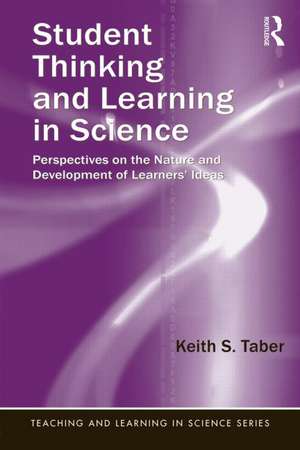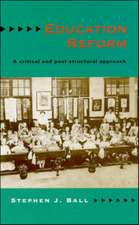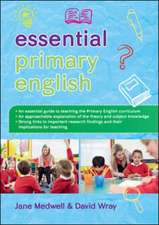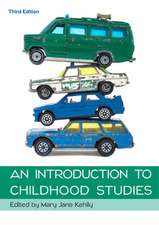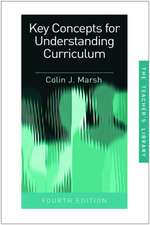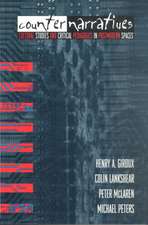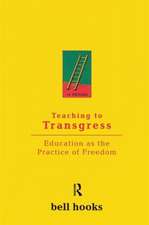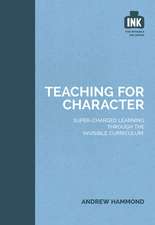Student Thinking and Learning in Science: Perspectives on the Nature and Development of Learners' Ideas
Autor Keith S. Taberen Limba Engleză Paperback – 25 apr 2014
Focused on secondary students and drawing on perspectives found in the international research literature, the goal is not to offer a comprehensive account of the vast literature, but rather to provide an overview of the current state of the field suitable for those who need an understanding of core thinking about learners’ ideas in science, including science education students in teacher preparation and higher degree programs, and classroom teachers, especially those working with middle school, high school, or college level students. Such understanding can inform and enrich science teaching in ways which are more satisfying for teachers, less confusing and frustrating for learners, and so ultimately can lead to both greater scientific literacy and more positive attitudes to science.
| Toate formatele și edițiile | Preț | Express |
|---|---|---|
| Paperback (1) | 437.71 lei 43-57 zile | |
| Taylor & Francis – 25 apr 2014 | 437.71 lei 43-57 zile | |
| Hardback (1) | 1055.51 lei 43-57 zile | |
| Taylor & Francis – 23 apr 2014 | 1055.51 lei 43-57 zile |
Preț: 437.71 lei
Nou
Puncte Express: 657
Preț estimativ în valută:
83.78€ • 91.04$ • 70.42£
83.78€ • 91.04$ • 70.42£
Carte tipărită la comandă
Livrare economică 21 aprilie-05 mai
Preluare comenzi: 021 569.72.76
Specificații
ISBN-13: 9780415897358
ISBN-10: 0415897351
Pagini: 238
Ilustrații: 5 black & white tables
Dimensiuni: 152 x 229 x 18 mm
Greutate: 0.34 kg
Ediția:1
Editura: Taylor & Francis
Colecția Routledge
Locul publicării:Oxford, United Kingdom
ISBN-10: 0415897351
Pagini: 238
Ilustrații: 5 black & white tables
Dimensiuni: 152 x 229 x 18 mm
Greutate: 0.34 kg
Ediția:1
Editura: Taylor & Francis
Colecția Routledge
Locul publicării:Oxford, United Kingdom
Cuprins
Contents
Preface
Acknowledgments
Section 1. Student conceptions and science
Introduction. The things students say: learners’ ideas about science topics
Chapter 1. Why is learning science so difficult for many students?
Chapter 2. Characterising and labelling learners’ ideas
Chapter 3. Alternative conceptions of learning
Section 2. Making sense of student thinking
Chapter 4. Innateness and development: cognitive biases influencing learners’ ideas
Chapter 5. Developing intuitions about the world
Chapter 6. The role of language in learning science
Chapter 7. The influence of everyday beliefs
Chapter 8. Thinking about knowing and learning: Metacognitive and epistemological limitations on science learning
Chapter 9. Integrating knowledge and constructing conceptual frameworks
Section 3. Diagnosing student thinking in science learning
Chapter 10. A provisional synthesis: Learning, teaching, and ‘bugs’ in the system
Chapter 11. The science teacher as learning doctor
Chapter 12. Science teaching informed by an appreciation of student thinking
Preface
Acknowledgments
Section 1. Student conceptions and science
Introduction. The things students say: learners’ ideas about science topics
Chapter 1. Why is learning science so difficult for many students?
Chapter 2. Characterising and labelling learners’ ideas
Chapter 3. Alternative conceptions of learning
Section 2. Making sense of student thinking
Chapter 4. Innateness and development: cognitive biases influencing learners’ ideas
Chapter 5. Developing intuitions about the world
Chapter 6. The role of language in learning science
Chapter 7. The influence of everyday beliefs
Chapter 8. Thinking about knowing and learning: Metacognitive and epistemological limitations on science learning
Chapter 9. Integrating knowledge and constructing conceptual frameworks
Section 3. Diagnosing student thinking in science learning
Chapter 10. A provisional synthesis: Learning, teaching, and ‘bugs’ in the system
Chapter 11. The science teacher as learning doctor
Chapter 12. Science teaching informed by an appreciation of student thinking
Notă biografică
Keith S. Taber is University Reader in Science Education, University of Cambridge, UK.
Recenzii
"I encourage science teachers of all specialities who are looking to enhance their classroom practice to pick up a copy of Student thinking and learning in science and accept Keith’s challenge to take on the role of ‘a science learning doctor’ and look to diagnose, prevent and ultimately cure bugs in their own teaching." - Catherine Smith, Education in Chemistry, Nov 2014
Descriere
This readable and informative survey of key ideas about students’ thinking in science builds a bridge between theory and practice by offering clear accounts from research, and showing how they relate to actual examples of students talking about widely taught science topics.
